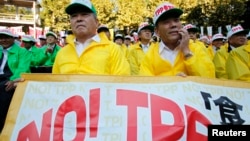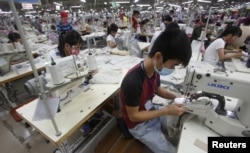U.S. President-elect Donald Trump's decision to withdraw from the 12-nation Trans-Pacific Partnership, or TPP, abandons a massive trade deal that was a key plank of President Barack Obama's re-engagement with Asian nations.
Trump says instead of one agreement that accounts for 40 percent of world trade, he plans to negotiate one-on-one trade deals that will be more favorable for American workers. For countries in Asia, analysts say abandoning the deal opens new trade opportunities for China, which was not a part of the TPP.
Negotiators worked for seven years on the TPP, which supporters say would encourage more trade among the 12 nations, raise worker incomes, place important protections on intellectual property, protect labor rights and incorporate environmental safeguards. Critics accused the deal, which was negotiated in secret, of being overly favorable to global corporations, and enshrining tough intellectual property restrictions.
More than a trade agreement
The Council on Foreign Relations in a report this month, backed the TPP, saying the pact “would benefit manufacturers “with a more level playing field in Asia,” boosting U.S. exports, especially agricultural goods. While some American jobs could be lost to overseas workers, TPP supporters argued that the deal was better overall for Americans, because it would result in lower prices on imported consumer goods.
The report, citing research by the Petersen Institute for International Economics, said the TPP offered potential annual gains of $78 billion for the U.S. economy.
Gareth Leather, senior Asia economist at London-based Capital Economics, called the demise of the TPP “a blow to economic prospects in emerging Asia [economies], with any benefits from a China-led regional trade deal “likely to be much smaller.”
Carl Thayer, a political scientist at Australia’s University of New South Wales, said Trump’s move could potentially harm U.S. relations, especially among key allies, Japan and Australia as well as Vietnam.
Thayer said the TPP is “effectively on life support, if not dead” with Trump ignoring calls by Japan's Prime Minister Shinzo Abe and other leaders to press ahead with the pact.
“It means that the entreaties by [Australian] Prime Minister [Malcolm] Turnbull and Abe – have just been ignored. [Although] Turnbull thinks it may be renegotiated,” said Thayer.
Reports said Abe had invested “considerable political capital” in pushing for the agreement, signed in October 2015, that faced strong opposition from Japan’s “influential farming lobby.”
Thayer said the TPP was more than a trade agreement.
“What it means is that 11 countries are theoretically up high and dry. This is not just a trade agreement; it's one that included services and intellectual property, environmental issues, climate change – it was a very high standard – and China was not [not] excluded, China just couldn’t meet these standards,” he told VOA.
Pavida Pananond, a professor of international business at Thailand’s Thammasat University, said the decision to withdraw by the U.S. raised fears of potential trade conflicts, especially between the U.S. and China. On Tuesday, the Communist Party's People's Daily newspaper said in an editorial that China-U.S. relations were "too big to fail."
Pavida said a major impact lay on the United States' perceived place in the global trade debate.
“Without the TPP, what would really happen would be that the U.S.’s leading role in the liberal idea of globalization and then regional and multilateral [trade] would see the U.S. role undermined from being a leader and having common rules and regulations for trade and development,” she told VOA.
As US looks inward, China expands
Capital Economics’ Leather said Vietnam and Malaysia would be hardest hit from the TPP failing to go into force.
While already enjoying low tariff access to the U.S., the main benefits lay in the elimination of non-trade barriers, including rules on government procurement, investment restrictions and hidden subsidies.
Thayer said Vietnam will be especially concerned, with a need to access the U.S. market, where it runs a trade surplus of $30 billion against a deficit of $32 billion with China.
“For Vietnam’s case, it will be a bitter disappointment. [But] the national assembly has saved itself the humiliation by repeatedly putting off the TPP ratification, whereas Malaysia was the first county that rushed right in and ratified the TPP – so they are going to lose out,” he said.
Malaysian officials from the Ministry of International Trade recently warned as many as 1 million jobs would have been created with the TPP in place.
Officials say Malaysia would seek out other trade opportunities, through the Association of Southeast Asian Nations (ASEAN) and free trade agreements with Australia, China, India, Japan, South Korea and New Zealand.
Triphon Phumiwasana, a partner with Bangkok-based Hatton Capital, said China is already expanding trade in the Asia-Pacific.
“China – it’s in their interests to expand the trade. They will continue to foster relationships with Southeast Asia. It’s to their advantage since the U.S. is focusing on domestic [issues]. China is looking outward,” said Triphon.
Capital Economics said the U.S. ‘retreat’ has opened the way for China to expand its influence. “Closer ties with China have the potential to provide a bigger boost to the rest of Asia,” said Leather.
China is expected to press ahead with its regional free trade deal, the Regional Comprehensive Economic Partnership (RCEP) that covers ASEAN nations, as well as Japan, India and Korea but excludes the United States.
While the Philippines, Thailand and Korea would gain from improved prospects from the RCEP agreement, any losses from the TPP were “unlikely to be fully compensated for by gains from the RCEP,” said Leather.










